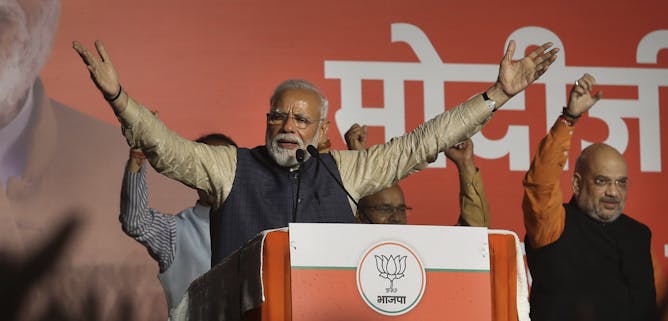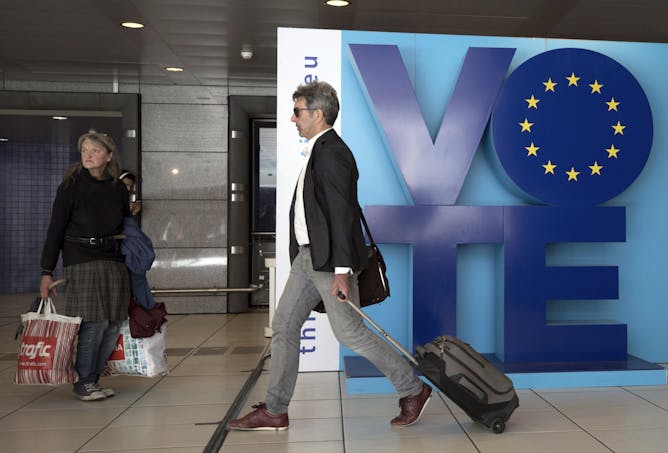|
While most Canadian sports fans are still recovering from the thrilling victory by the Toronto Raptors on Saturday night, don’t forget that the Stanley Cup finals start tonight. Millions of hockey fans around the world will watch. That’s a far cry from the 500 or so people who saw this year’s championship of the Canadian Women’s Hockey League. Today in The Conversation Canada, marketing scholar Katie Lebel of Ryerson University explains how the National Hockey League could help the women’s game by offering financial, marketing and other kinds of assistance – similar to the way the National Basketball Association has helped the Women’s
NBA.
That’s just one of our great reads to start your week: Chandrima Chakraborty of McMaster University explains how Narendra Modi’s victory in the Indian elections is partly explained by his ability to portray himself as a selfless Hindu ascetic devoted to the nation – an image carefully cultivated over decades by the Hindu right; Rhoda Howard-Hassmann of Wilfrid Laurier University looks at competing human
and religious rights that are part of the debate around Québec’s controversial Bill 21; Alex Ellery of Carleton University tells a scary tale about all the satellite junk that’s rotating around the Earth because, as he so eloquently puts it, we have “spread of our scorched-earth habits into space.”
And we leave you today with a wonderfully insightful piece by Stephanie Liu of the University of Alberta, who writes as both physician and a mother. After the birth of her daughter, she had trouble breast feeding and that has given her new insight into patients who often suffer postpartum depression if they are unable to breast feed their newborns.
Regards,
|

The Toronto Furies huddle up before their match-up against crosstown rivals, the Markham Thunder.
Photo Credit: Dave Holland
Katie Lebel, Ryerson University
Corporate brands have a potentially lucrative opportunity with women’s hockey. All they need to do is have a little imagination and take a chance on long-term potential.
|

Indian Prime Minister Narendra Modi addresses party supporters, standing next to his Bharatiya Janata Party (BJP) President Amit Shah at their headquarters in New Delhi, India, May 23, 2019.
(AP/Manish Swarup)
Chandrima Chakraborty, McMaster University
India's re-elected Prime Minister Narendra Modi delivered a victory speech that presented himself as a selfless and humble ascetic. This vision goes far to promote a Hindu nationalist 'new' India.
|

People hold up signs as they march during a demonstration in Montreal, April 7, 2019, in opposition to the Quebec government’s newly tabled Bill 21. T.
HE CANADIAN PRESS/Graham Hughes
Rhoda E. Howard-Hassmann, Wilfrid Laurier University
The proposed secular law (Bill 21) in the province of Québec appears to be directed primarily against Montreal and Québec City, and reflects a fear of strangers in Québec’s more homogeneous regions.
|

There are tens of thousands of pieces of space debris orbiting the Earth, and the amount is growing.
Shutterstock
Alex Ellery, Carleton University
There needs to be an international approach regarding the management and disposal of space junk.
|

The breastfeeding relationship is not always a dream. It can be challenging, physically painful and cause guilt and postnatal depression for many mothers.
(Shutterstock)
Stephanie Liu, University of Alberta
A doctor argues that breastfeeding should be encouraged, but not at the expense of a mother's mental health.
|

Près de 400 millions d'Européens de 28 pays sont appelés aux urnes jusqu'à dimanche pour élire les membres du parlement européen.
Le taux d'abstention est souvent élevé, et des campagnes encouragent les citoyens à aller voter, comme ici à la station de métro Luxembourg, à Bruxelles.
AP Photo/Virginia Mayo
Laurie Beaudonnet, Université de Montréal
Les élections européennes sont souvent perçues comme de seconde importance par les électeurs, et souvent l’occasion de voter « avec son cœur » ou « avec ses pieds ».
|
Politics
|
-
Andrew Bell, Indiana University
Letting bad behavior go unpunished can undermine respect for the law of war.
|
|
Science + Technology
|
-
Marcus Byrne, University of the Witwatersrand
Dung beetles are largely invisible. And yet without their vital activities, the world would have a lot more faeces in it.
|
|
Arts
|
-
Siobhan Lyons, Macquarie University
From the Joker to a Game of Thrones prequel, origin stories are increasingly common in film and TV – perhaps at the expense of originality in popular culture.
|
|